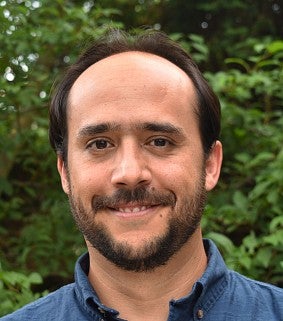Faculty bio | Research website | 541-346-3488 | X / Twitter
Biography:
Diego Melgar is an academic expert in earthquakes, tsunamis, seismology, early warning systems, strong ground motion and geodetic imaging. Diego’s research focuses on the physics of large earthquakes and the hazards that they generate. He is especially interested in the rupture processes at faults and in how these generate tsunamis and strong shaking. He specializes in using diverse data sets including land-based, ocean-based, and space-based techniques to study major events around the globe. He also applies the basic science insights from these studies towards building the next generation of earthquake and tsunami early warning systems.
Recent Media:
- How ‘the big one’ near Seattle could trigger an earthquake in San Francisco (National Geographic, Oct. 23, 2025)
- The Pacific tsunami response is a warning about federal funding for science (MSNBC, July 31, 2025)
- Why one of the world’s biggest earthquakes wasn’t followed by a monster tsunami (The Washington Post, July 30, 2025)
- Why did such a powerful earthquake produce such a weak tsunami? (The New York Times, July 30, 2025)
- Why the Russian earthquake didn’t cause a huge tsunami (Scientific American, July 30, 2025)
- Live updates: Millions remain under tsunami advisories following powerful earthquake (Associated Press, July 30, 2025)
- A tsunami that never ends? Study highlights a looming West Coast risk. (USA Today, May 24, 2025)
- 'Ground would sink': New research on big earthquake shows how bad it would be at the coast (KGW, April 29, 2025)
- 'My entire family was gone': Aceh thrives 20 years after tragic tsunami, but anguish remains (Channel NewsAsia, Dec. 23, 2024)
- LIVE TV: Early warning system explainer (KTVU, Dec. 6, 2024)
- Emergency responders say tsunami warning response went 'according to plan' (KTVU, Dec. 6, 2024)
- Tsunami warning lifted for southern Oregon and California coast (KGW, Dec. 5, 2024)
- Tsunami researchers hunt for clues about the next big Pacific Northwest quake (The Washington Post, Dec. 2, 2024)
- What to do in a disaster: Everything you need to know if a big earthquake hits Oregon (The Register-Guard, Oct. 21, 2024)
- This part of the US is at highest risk for a devastating tsunami (CNN, June 16, 2024)
- Earthquake early warning system for Oregon, Washington and California gets upgrade (Oregon Public Broadcasting, June 9, 2024)
- ‘This is a big deal’: New technology will alert Pacific Northwest of the next major earthquake (KOIN, June 7, 2024)
- ‘ShakeAlert’ earthquake early-warning system gets major upgrade (KGW, June 6, 2024)
- VIDEO: What's the ONE THING you can do to survive a tsunami? Cascadia Subduction Zone (PBS Terra, Jan. 30, 2024)
- What the anniversary of the Great Cascadia earthquake might tell us about 'The Big One' (The Register-Guard, Jan. 27, 2024)
- Researcher looks back on anniversary of Pacific Northwest's biggest earthquake: 'It will happen again. It's an unavoidable truth' (KGW, Jan. 26, 2024)
- Cascadia earthquake turns 324. What an ‘ancient’ quake says about the next one (KOIN, Jan. 26, 2024)
- University of Oregon leads collaboration on earthquake research (Oregon Public Broadcasting, Sept. 19, 2023)
- New earthquake research center at University of Oregon ‘first of its kind’ in the nation (FOX12 Oregon, Sept. 8, 2023)
- Feds award $15M for new cutting-edge research center to study Pacific NW earthquakes (GeekWire, Sept. 8, 2023)
- UO to lead new earthquake research center (University of Oregon, Sept. 8, 2023)
- ‘Folks in Alaska should take this seriously.’ Anchorage not safe from tsunamis, study finds (Science Magazine, Aug. 16, 2023)
- Why a tsunami went on ... and on ... and on ... (Nature, Oct. 8, 2022)
- Edge waves, continental shelf fueled the 2021 Acapulco Bay tsunami (EurekAlert, Sept. 27, 2022)
- Was a humongous Cascadia earthquake just one of many? (Live Science, May 7, 2021)
- GPS data help warn of rare tsunamis (GPS World, March 6, 2020)
- GPS is going places (Ars Technica, Dec. 26, 2019)
- When should we issue earthquake warnings? It’s complicated. (Popular Science, Nov. 22, 2019)
- UO is leading an effort to speed up tsunami warnings (OregonNews, Sept. 30, 2019)
- Earthquake size is not foretold in the first second of rupture, study finds, shortening warning times (Temblor, Oct. 14, 2019)
- NASA Grant To Help NOAA Forecast Tsunami Strength And Location (KLCC, Sept. 30, 2019)
- Private Companies Shake Up Mexico City’s Earthquake-Alert System (The Wall Street Journal, Sept. 23, 2019)
- Quake survivor seeks solutions as UO professor (The Register-Guard, Sept. 23, 2019)
- UO-led study finds early indicator of an earthquake’s magnitude (Around the O, May 30, 2019)
- A Signal in Giant Earthquakes That Could Save Lives (The New York Times, May 29, 2019)
- Discoveries about 2017 Mexican Earthquake Rattle Geologists (The Weather Channel, Oct. 26, 2018)
- Quake split a tectonic plate in two, and geologists are shaken (National Geographic, Oct. 24, 2018)
- Why tsunamis are so difficult to predict (The Christian Science Monitor, Oct. 22, 2018)
- ¿Qué tan difícil es predecir un tsunami? (CNN en Español, Oct. 2, 2018)
- Mexico City’s potent 2017 earthquake was a rare ‘bending’ quake – and it could happen again (The Conversation, March 12, 2018)


